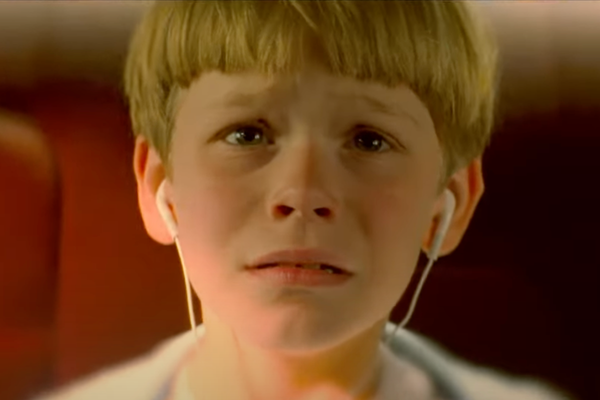
This must be the first time I’ve gone to a movie and wondered if I and the five other people in the cinema qualify for some kind of watchlist; whether me and the middle-aged couples with shopping massed at their feet are somewhat suspect merely by dint of ducking into the Melbourne Central mall to pay for a midday showing of Sound of Freedom, “QAnon’s first blockbuster”.
The film has been surrounded by controversy since it started its climb to the top of the US box office without major studio backing. Lead star Jim Caviezel has spouted a lot of the baseless theories and rallying catchphrases of the QAnon movement in recent years, and the film’s subject (wealthy international child sex trafficking rings) plays right into a lot of Q-adjacent thinking.
In the midst of this, right-wing media figures such as Ben Shapiro and Jordan Peterson have expressed their support for the film, and former US president Donald Trump hosted a screening at his golf club. Closer to home, the New South Wales Liberal Party’s Willoughby state electorate conference organised a screening of what it called a “resounding call to rally against injustice”.
So is the film a fascinatingly bonkers bit of insta-kitsch for our times, or a terrifyingly effective bit of conspiracy bait? I’m relieved and disappointed to report it’s neither.
The basic on-screen parameters of Sound of Freedom could have happened any time in the past 50 years, and it’s important to note there’s nothing all that explicitly QAnon about the movie itself. It’s deeply right-wing, sure, but I’d argue you’d be misguided expecting anything else of the true(ish) story of a white guy going outside the limits of the law to save children from South American sex traffickers.
Our hero is Tim Ballard, a Homeland Security agent coming to worry that his job — busting paedophiles for sharing child exploitation material in the US, while the children continue to suffer outside his jurisdiction — isn’t enough. Frustrated by his bosses’ reluctance to finance his work outside the US, he eventually quits and goes rogue with a few sidekicks to rescue imperilled kids.
Telling the story of a renegade who can’t let another dirtbag walk on account of weak laws and the bindings of bureaucracy is about the most commonplace action film premise there is. We’ve been wrestling with the politics implied by that setup at least since Pauline Kael wrote of the “fascist potential” of action films that had been conclusively raked to the surface by the “stunningly well-made” and “deeply immoral” Dirty Harry.
But that film, as well as many of the movies that would echo it over the following decades, was animated by something — either some genuine interest, however shallow, in human darkness, or perhaps some twisted glee in creating monsters who could be destroyed with impunity — that Sound of Freedom simply cannot allow itself, on any level.
Firstly, the human level. Caviezel, who plays Ballard with narrow, haunted eyes and a voice that never once rises above a grizzled whisper akin to a hollowed-out Clint Eastwood, sets the mid-tempo tone. He is brave, unimpeachable and heroic (his boss is incredulous when he quits 10 months short of his pension). The film isn’t interested in anything else about him.
He is clearly driven by his Christian faith, but if he suffers any crisis of that faith by immersing himself in the worst sickness of the world his God created, we never know about it. Mira Sorvino is inexplicably in the movie for a total of maybe five minutes of bland exposition trading as Ballard’s wife Katherine — “So you quit your job and you rescue those children,” she tells Ballard and any audience members who haven’t been paying attention. The post-script says Ballard credits Katherine with inspiring the whole idea of his anti-trafficking group Operation Underground Railroad, but whatever strain his work put on their relationship, and whatever it cost Katherine to let her husband do such dangerous work, the film doesn’t have the slightest curiosity about.
Ballard has to go undercover, charming and flattering people who sell children into sex slavery — what it might do to Ballard’s psyche to pretend to be someone like that, how it affected his relationship with his own children, again, SoF has no time for.
But the film also fails on the cinematic level. In a “special message” that accompanies the credits, where Caviezel grandly compares the film we’ve just seen to Uncle Tom’s Cabin and urges us to spread the word of the movie’s powerful message, he talks about the singular power of cinema. But this is a power Sound of Freedom simply doesn’t possess.
Let me give you one example. There are certain musical cues so commonplace in passable movies that you’ll be able to call to mind as I describe them. The spooky clock chime when things are about to get dark. Jazzy, faux-Latin percussion as our heroes put the plan together. Faint operatic singing accompanying images of innocence in an impure world and/or as a counterpoint to righteous slo-mo violence. This movie uses all of them, quite a lot.
The cinematography, by Gorka Gómez Andreu, is genuinely good, and (besides a thunderingly obvious CGI helicopter) the filmmakers make the most of their modest budget. But the storytelling is on autopilot, resulting in a movie that plays to the extreme fringes of modern politics and deals with just about the most disgusting crime one can name and yet still manages to be, well, dull.
There is a lot of queasy focus on innocent children about to be the victims of horrific violence, but only once does the film summon a true gut punch: when one of the many onscreen creeps enters a girl’s room and draws the curtains, we see the building from the outside, and there’s no music, just the sounds of the oblivious street. The shot holds for what feels like a long time, and your stomach churns.
Elsewhere the film can allow itself no real life, merely a faded photocopy of tropes taken from other movies. It reminded me of the kind of thing you’d encounter during the days Foxtel had three 24-hour movie channels to fill: passable, cheap and easily forgotten. It’s pointless to engage with its politics all that much; the film says in its postscript there are more slaves now than at any other time — which is true, but the vast majority of those are not sex slaves but labour slaves, the grease in the cogs of the world economy, the inevitable product of a system that Trump, Shapiro, Peterson and their supporters seem perfectly happy with.
It feels very of the era, I suppose — this whirlwind of controversy surrounding a film that, were it not weighed down by the politics and projections, would float off like a Roman candle and disappear just as quickly.







